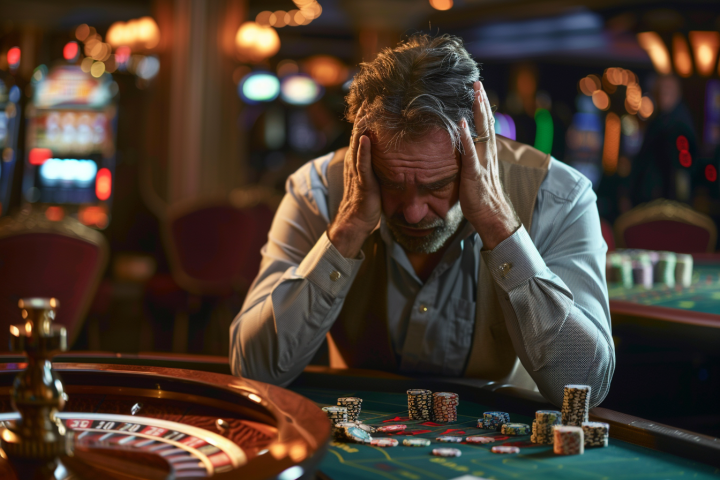Responsible Gambling Guide
Gambling is a popular pastime that can provide entertainment and even make you a little money. However, when used irresponsibly, gambling can become an addiction. Like any addiction, excessive gambling can cause financial and social strain. It can also contribute to poor physical and mental health and impact a person’s ability to maintain a job and pay their bills.

Key Takeaways:
- Problem gambling refers to compulsive gambling or gambling addiction, where people are unable to stop themselves from betting higher and higher sums of money.
- There are several ways for people to make sure they gamble responsibly.
- Gambling operators offer a bunch of tools that gamblers can use to improve their gambling habits. They can also reach out to professional support systems such as gambling helplines.
- Problem gambling is a tricky issue, but a manageable one.
- Anyone can be at risk for irresponsible gambling if they’re negligent around their gambling activities.
What Does Responsible Gambling Even Mean?
Anything can be misused for the wrong reasons and gambling is no different. ‘Responsible gambling’ refers to the ability to effectively manage your gambling activities. This includes being able to set gambling budgets, play within constraints, stay aware of the risks of gambling, and recognize when you might be heading down the wrong way.
Casino games do tend to be addictive in themselves, but that becomes an even bigger challenge when money is involved. Sometimes individuals lose control for the thrill of it, other times they might chase losses just to attempt to gain their winnings back.
The bottom line is that slots and poker might be all fun and games, but some individuals might find themselves unable to stop. There can be several reasons behind this behavior but the main goal is to recognize when one might be falling down that trap.
According to statistics by the National Council on Problem Gambling, around 2.5 million adults in the US have a severe gambling problem, enough to cause alarm. It might just be 1% of the total population, but these two million individuals require adequate help to deal with this issue.
Furthermore, according to a Guardian report, the UK might have as many as 1.3 million problem gamblers. A Canadian study also revealed that around 300,000 adults in Canada were at risk of problem gambling.
The issue has become increasingly worse with the advent of online gambling because now people don’t need to step out of the home to place their wagers. While most adults gamble safely and responsibly, others need encouragement from time to time.
This responsibility falls on the gambling authorities as well as the gambling operators. You can only truly enjoy gambling as a form of entertainment if you manage to execute it in a level headed manner while exhibiting self-restraint. Without this discipline, the fun can turn into a nuisance pretty quickly, bringing several problems along with it.
This guide touches upon responsible gambling in detail. Learn how you can secure your own gaming habits, and also of those around you. Looking out for yourself and your loved ones is essential to make sure that everyone can enjoy gaming for the fun activity it is, without letting it become too stressful!
Essential Tips For Responsible Gambling

Both beginners and veteran players can struggle with safe gambling from time to time - and that’s perfectly fine. Here are some of our recommended tips for how you can keep your gambling problems in check:
1. Set a budget limit
Gambling without any pre-set budget can put you in a difficult situation because you might find it difficult to stop in the heat of the moment. The best way to manage this issue is to set budget limits on how much you’ll spend in the casino.
You can decide to set daily, weekly, or even monthly limits. Just make sure to come up with a realistic figure and then follow through with it. Self-discipline is the key when it comes to making sure that you stick with your gambling limits no matter what happens. As tempting as one more spin at the slot looks like, remind yourself not to go over your budget.
2. Try not to gamble when you’re feeling sentimental
Most people use their hobbies as a way to relax themselves when they’re particularly upset, angry, or stressed, but gambling might not be the best hobby to use in this manner. Using it as a coping mechanism can lead to abuse and cause many problems in the future. The losses may also leave you feeling worse than you did before, so it’s almost a lose-lose situation.
3. Remind yourself that gambling is for entertainment
Casinos are not for people who are looking to make an income through gambling. Winning anything on the games is quite tough, and not a consistent source of income. In fact, you should consider gambling a form of paid entertainment that you engage with just for the fun of it. It’s not a way to generate cash flow and it certainly won’t pay you huge bucks every time.
Winning bets requires skill, expertise, and patience. For the one time you win, there will be several other times you don’t. When you activity from this lens, you’re less likely to fall into a spending trap.
4. Do not try to chase your losses
The fact is that you’re more likely to lose a bet than to win it, considering that the House has an edge in every casino game. However, if you fall into the obsessive habit of betting until you finally land a win, you might be looking at massive losses instead.
Every responsible gambler should be able to understand when it’s time to let go of the game and call it a day. Chasing your losses might leave you in a bigger mess than where you started.
5. Do not gamble on your credit card
It’s never a good idea to borrow money to gamble because that means you’re entering the dangerous territory of betting above your means. It’s best to never gamble on a credit card, as convenient as that option may sound. Even when online gaming operators give you the option of signing your card up, choose the debit card option. You can also consider the plethora of other options, such as bank transfers and e-wallets, all of which are offered by most gambling websites.
6. Budget your time as well
In addition to your money, you should also set a limit on the time you’ll spend with the gaming operators. As a general rule of thumb, the less time you spend gambling, the less money you’re going to bet. Also, taking breaks from time to time will let you have a cooling off period.
When budget and time are limited together, you can expect a high level of control over your gambling behaviors. This is especially easy when gambling online because many casino websites will allow you to set these limits, after which the website will give you warnings and block you from playing further.
7. Avoid gambling when consuming alcohol
People tend to be a bit more impulsive when they’re under the influence, which is why you should avoid mixing the booze with the cards. It’s okay to have the occasional drink or so, especially if you’re gambling to release stress, but only if you think you can drink moderately. Even though gambling is a form of entertainment, it’s best undertaken with a clear head so that you don’t accidentally make a rash decision.
8. Find a balanced mix of interesting hobbies
Considering that gambling is a form of entertainment, it’s a good idea to have a few options at hand. If gambling is the only hobby you enjoy spending time with, you might end up spending a lot of hours. On the other hand, if you have multiple exciting choices to consider, you’ll find yourself attracted to other hobbies of yours as much as gambling.
9. Do not let bonuses affect your judgment
Bonuses and promotional offers are designed to give players an incentive to wager more, but not every bonus may be a good offer in reality. Read through all the terms and conditions before you try pursuing a bonus. Promotional offers may push people to waste more money as well, so just be wary of these deals.
Here’s How You Effectively Manage Your Bankroll

Bankroll management refers to creating a budget plan that helps you effectively decide how much money you’ll use from betting. While setting a budget limit is the main way to do this, there are also several other things you can consider doing:
Diversify your bets:
This is the same tip that experts offer for investments. Instead of relying completely on one wager to pay off, diversify the kind of bets you place. This is especially relevant to sports betting, where those placing bets have the option to bet on various leagues in plenty of different ways.
Use online bank management tools:
Most online gambling operators will give you the option to pick time limits, deposit limits, or loss limits. Make use of these options to ensure you don’t overstay your means.
Set loss limits:
Even though you’ve set a limit on your budget, it’s also good to set a separate limit on losses. You might end up winning some of the bets you place from your budget, which may be an encouragement to play more. But try not to add the money you win to your budget right away, and set a limit on how much you can lose in each session before you give up playing for the day.
Bet small:
Losing smaller bets puts less of a dent in your budget, but small wins can accumulate a lot over the long run.
Pick the right games:
Each game offers a different set of stakes and RTP ratio, make sure to go through these so you pick something that fits best within your bankroll.
Why Problem Gambling is an Issue

Excessive gambling causes addiction because it affects the brain in the same way that drugs and alcohol do. Once people start gambling compulsively, it becomes hard to stop. You may find yourself overspending your budget, dipping into your savings, or even racking up debt just to get another shot at betting. This can often lead to severe financial crises which can even affect people’s livelihoods and living conditions.
But this issue comes in combination with a bunch of other problems as well. The individual may start isolating themselves from loved ones and lying about their gambling behaviors. They might start performing poorly at work and distancing themselves from the people around them. Excessive gambling may also leave you amid legal problems, considering that some individuals even turn to fraud to fulfill their gambling addiction.
This is why responsible gambling is not just a concept to be taken lightly. It is an absolute need for anyone who wishes to spend their time at a casino. Without these mechanisms in place, you may place yourself in danger of various kinds.
How To Recognize Irresponsible Gambling?
Gambling addiction isn’t something that happens out of the blue, there are always warning signs. It starts with irresponsible behavior around one’s gambling habits and then proceeds from there. Here are some warning signs that will help you realize when you or your loved ones may be slipping down that road:
- Lying about their gambling problem: Problem gamblers may often try to lie about their gambling or come up with excuses to hide it and cover it up. This is one of the biggest signs that someone might be on their way to becoming a problem gambler.
- Constantly thinking about your next bet: If you find yourself thinking about gambling even when you’re preoccupied with other things, it’s a troublesome sign.
- Going over your budget: If you constantly find yourself going over the limits you’ve set for yourself, whether monetarily or playtime-wise, it may be a sign of alarm. Many compulsive gamblers have a hard time ending their playing sessions.
- Borrowing money to gamble: If you find yourself loaning out money and racking up debts just to be able to gamble a bit more, it’s time for you to step away.
- Missing out on social, personal, and professional commitments: Problem gamblers cannot control their betting, so they want to spend most of their time at a casino. This means that they’ll start skipping out on other commitments in their life, drawing themselves away to the casino for most of their day.
- Experiencing withdrawal symptoms: Since gambling is addictive, it can also result in people having withdrawal symptoms. If you find yourself feeling anxious, depressed, or restless when you’re away from the casino for a while, you may be in the process of experiencing withdrawal.
- Using gambling as a coping mechanism: If you find yourself running to place a bet every time something goes slightly wrong in your life, you might have latched onto gambling as a coping mechanism for the issues in your life.
- Failing to cut down on gambling: A big sign of problem gambling is trying to cut down on your time at the casino or with online gaming but repeatedly failing to do so. This is a warning that there is some deeper issue at work here that you need to resolve.
Causes Behind Gambling Addiction
While there aren’t any particular causes of gambling, there are several risk factors that may mean you have a higher chance of developing a gambling addiction:
- Genetics - If problem gambling runs in the family, individuals of the younger generations are much more likely to fall into the same patterns. Nearly 50% of gambling addiction comes from genetic factors.
- Age - Young people or middle-aged individuals are more likely to develop compulsive gambling, especially if they start gambling at a young age. However, gambling is also an issue with older people.
- Social Influence - If you’re surrounded by individuals who spend a lot of their time gambling or if your circle organizes a lot of hangouts at the casino, you’re more likely to develop compulsive gambling, along with the rest of your peers.
- Sex - According to the Mayo Clinic, gambling is more common in men than in women. However, their research also shows that women might become addicted more quickly. They also started gambling much later on in life, as compared to men.
- Mental Health Issues - Compulsive gambling can be associated with mental health issues such as depression, anxiety, substance abuse, personality disorders, and even OCD and ADHD.
- Personality - Individuals with personality traits such as impulsivity or competitiveness may be more likely to develop irresponsible betting.
What Steps to Take Once You Recognize Problem Gambling
If you do find yourself or a loved one becoming highly involved in problem gambling, all is not lost. Recognizing it is just the first step to finding a solution, there are several approaches you can try to make sure you bring yourself out of that pattern of excessive gambling.
- Block your access to gambling locations. Stop going to the casino and use an app blocker that blocks gambling apps and websites on your personal devices. This is one of the best ways to nip the issue in the bud, making sure that you don’t even have access to gambling anymore. A more lenient way of practicing this strategy would be to decrease your spending limits as well as time limits. But if that’s not enough, blocking is the way to go.
- Practice self-exclusion. This is a tool that land-based casinos offer their gamblers so they can time out and take a cooling off period. You can enter into an agreement with the casino, which prevents you from entering the establishment for a while. This will also keep you away from the source of the issue.
- Find other hobbies to keep yourself busy. If you’ve been neglecting friends and family members because of your gambling, try spending more time with them. Try to find other hobbies that help you spend your time productively while also taking your mind off of the casino games.
- Ask for support. There are several helplines and official resources out there that can provide people with the professional help they require to overcome their misuse of gambling options. It’s a good idea to sign up for one of these options and let an expert help you.
- Join a support group. This is another way of asking for help from the community. Support groups are helpful because they help you connect with individuals who are struggling with the same things as you are, providing a sense of connection and relief. They might not be a great option for everyone, but they’re a choice worth considering if you’re struggling to manage yourself.
A Casino’s Role in Promoting Responsible Gambling
Each casino establishment has a responsibility to make sure that its gamblers have all the tools they require to gamble safely and securely. Some of the ways a casino can ensure that are:
- Many casinos offer responsible gambling tools and programs to help their gamblers. These include self-exclusion programs, betting limits, deposit limits, time limits, and professional resources. The limits are especially useful for responsible gambling in online casinos.
- Casinos should make sure to advertise gambling responsibly, encouraging people to be vigilant about their betting. They should also ensure that they’re not advertising to vulnerable populations such as drug addicts or underage individuals. This is where marketing communications become very important.
- Casinos are also responsible for having enough security in place that they’re able to prevent underage gambling. The staff should always be on the lookout for anyone who is trying to gamble below the age limit.
- Another option for the casino is to train their employees to be able to recognize the signs of problem gambling. This way, the staff will be fully equipped with the methods and techniques they can use to direct people toward the resources they can use to improve their control of gambling.
- Lastly, casinos can choose to aid awareness and research campaigns. There are always new studies being conducted on gambling addiction, as well as awareness campaigns aimed at advocating for responsible gambling. Casinos can set apart a budget to participate in these things so they’re offering something productive to the wider community.
- Casinos must also make sure to comply with all the laws and regulations surrounding gambling in their area because these rules also make sure that responsible gambling is practiced as much as possible.
Responsible Gambling Tools by Casinos
Most online gambling sites offer various responsible gambling tools that bettors can utilize when they find themselves gambling irresponsibly. Some examples of these include:
- Limits: These are limits placed on various casino activities, such as deposit limits, session time limits, loss limits, and wager limits. Once you reach the limit, you cannot continue the activity until the limit is renewed. These limits can be weekly, daily, or monthly.
- Cooling off period: This allows you to stay away from the casino for a particular amount of time. Usually, you will be excluded from all promotional offers and will not be able to deposit more money while the period is active.
- Self-exclusion: Once you contact the casino to put you into self-exclusion, your account will be disabled until the period is over. You will also not receive any promotional offers during this time.
Responsible Gambling Resources
Considering how big of an issue gambling addiction is, several official resources offer people the support they require to get through this tough time. You can reach out to any of the responsible gaming tools below for yourself or on behalf of a loved one and ask for professional support:
Responsible Gambling Resources in the US

Considering how big of an issue gambling addiction is in the US, several official resources offer people the support they require to get through this tough time. You can reach out to any of the responsible gaming tools below for yourself or on behalf of a loved one, and ask for professional support:
National Problem Gambling Helpline (1-800-GAMBLER): This number is operated by the National Council on Problem Gambling, and is a comprehensive resource for any kind of help you may require. There are state-specific versions of the hotline for every state, other than the national gambling helpline.
Gamblers Anonymous: Gamblers Anonymous is a support group of anonymous gamblers who come together to help each other with responsible gambling. The organization is called Gamblers Anonymous because the individual players keep their membership a secret. This is done to protect players. People find some of their best free practical advice here.
GamTalk: This is another responsible gambling support group but it’s available online 24/7 and is moderated.
Responsible Gambling Resources in the UK

Gordon Moody ([email protected]): Gordon Moody is a UK-based charity helping people deal with their lack of responsible gambling.
GamCare: This is an online gambling support service offering live chat rooms and message boards. Gamblers also have the option of calling the helpline at 0808 8020 133.
Responsible Gambling Resources in Canada

Responsible Gambling Council: This is an online resource for Canadians to locate trusted responsible gambling resources near them.
Ontario Problem Gambling Helpline (1-888-230-3505): This is an Ontario-specific gambling helpline for those who're looking for gambling support.
Final Thoughts
Responsible gambling is the biggest key to ensuring that gambling stays an enjoyable experience for everyone without causing any issues. If you witness a gambling behavior in yourself or a loved one that points to a gambling addiction, make sure to reach out to professional support as soon as possible. The problem is manageable, especially if it's caught early on. Make sure to take care of yourself and let gambling be what it is - a fun way to pass the time!







